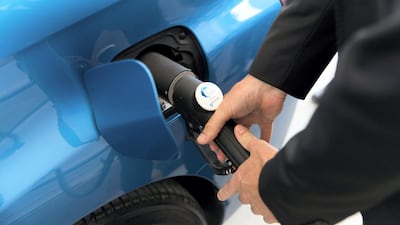The Middle East is well placed to tap into green hydrogen due to its track record in developing low cost renewable energy and offers increasing opportunities for private players, according to Natixis.
The French investment bank estimates that investments in hydrogen, an alternative fuel, will exceed $300 billion through to 2030. The green variant of the gas is manufactured using renewable power sources.
"In terms of production costs [for renewables], the Middle East has really led the way in the last few years and converting that to very low-cost hydrogen production is obviously the natural next step," Ehsun Zaidi, Middle East head of investment banking at Natixis, said.
Hydrogen development is high on the agenda of both the UAE and Saudi Arabia as the countries aim to decarbonise their economies.
Abu Dhabi announced the formation of a hydrogen alliance earlier this year to step up investment into the clean fuel. Saudi Arabia has plans to sell green hydrogen through pipelines to Europe.
The kingdom aims to be an exporter of hydrogen as it adjusts to the global energy industry's shift to cleaner fuel sources.
Last year, a consortium comprising industrial gases company Air Products, Saudi-based clean energy company Acwa Power and Neom, the planned futuristic mega city in the kingdom’s north-west, agreed on a $5 billion project to produce hydrogen using solar and wind energy.
In a report published on Monday, Natixis noted that $70bn of funding to develop hydrogen will largely be led by the public sector.
The main challenge for the sector is to attract private capital to "complement these sources of public funding", said Ivan Pavlovic, the author of the report.
Hydrogen has attracted significant funding in the EU through an enhanced package to build 40 gigawatts of internal market capacity and 40 gigawatts of neighbouring market capacity in North Africa and Ukraine.
The gas is already being trialled for use through public-private partnerships in the waste management sector in France, Mr Pavlovic said.
The use of hydrogen as a fuel in transportation could further accelerate demand, attracting more private capital.
"In addition, but obviously taking a much [more] forward looking approach with a potential introduction by 2035 of hydrogen-fuelled aircraft, you could have a two-fold source of hydrogen demand in these places – one coming from infrastructure and the other one coming from the aircraft," he said.
McKinsey estimates that the development of a hydrogen economy could generate $140bn in annual revenue by 2030 in the US alone.
More than 30 countries have already unveiled hydrogen roadmaps worldwide, with 228 large-scale hydrogen projects announced across the value chain, according to the Hydrogen Council's Hydrogen Insights 2021 report.


